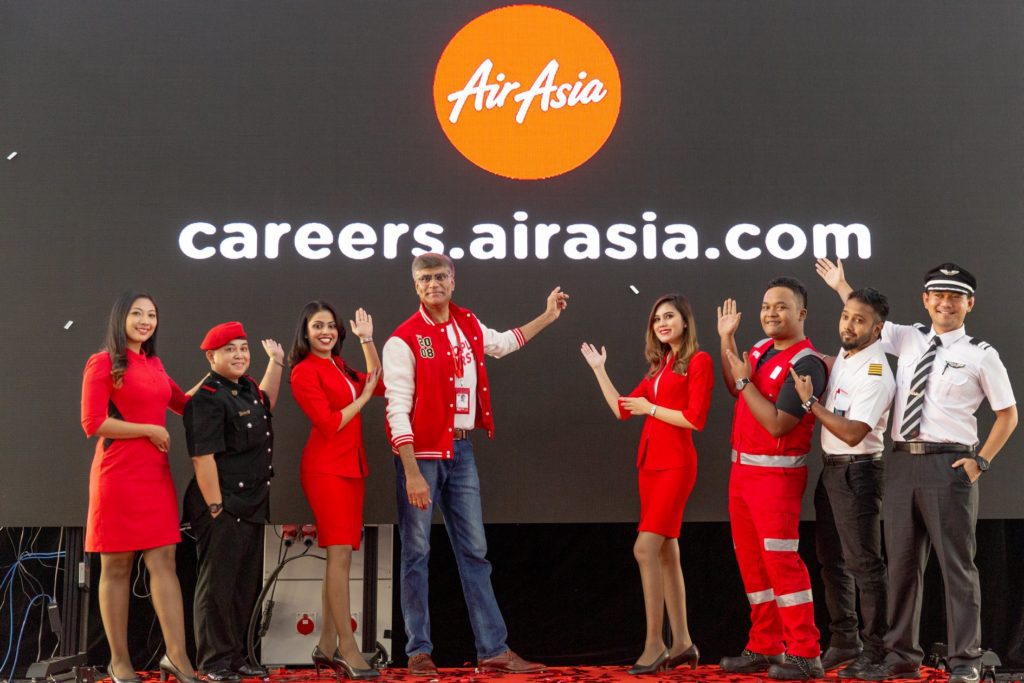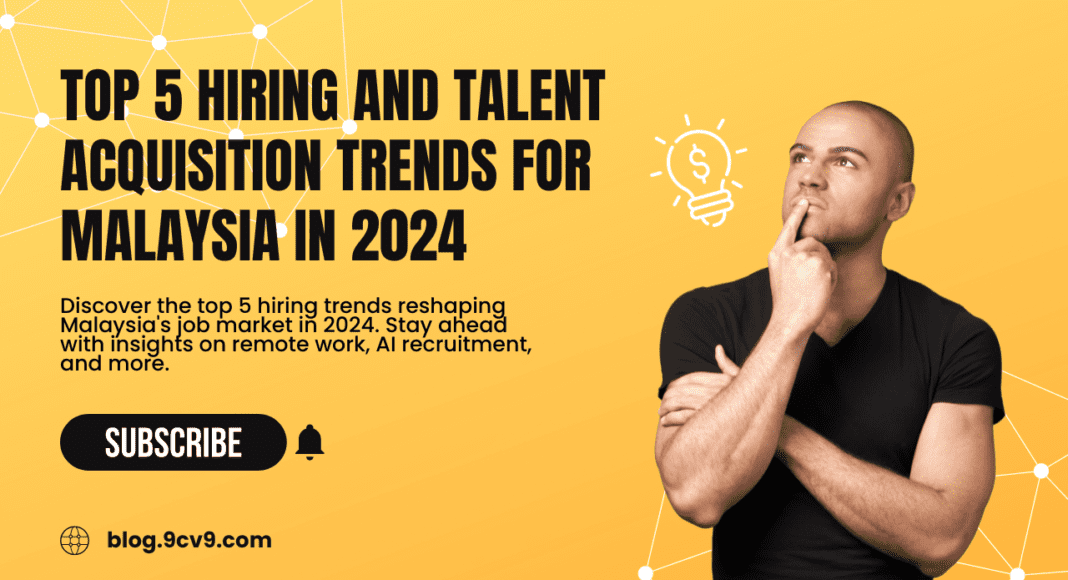Key Takeaways
- Embrace Remote Work: Adapt to the Remote Work Revolution to access a global talent pool and foster flexibility in your workforce.
- Invest in AI and Automation: Harness the power of AI-driven recruitment tools to streamline processes and make data-driven hiring decisions.
- Prioritize Diversity and Inclusion: Cultivate an inclusive workplace culture and leverage diverse talent to drive innovation and organizational success.
In the dynamic landscape of talent acquisition and recruitment, staying abreast of emerging trends is not just advantageous – it’s imperative for businesses striving to maintain a competitive edge.
As we navigate the nuances of hiring in Malaysia in 2024, it’s paramount to dissect the prevailing currents shaping the employment landscape.
Welcome to our comprehensive guide delving into the “Top 5 Hiring and Talent Acquisition Trends for Malaysia in 2024,” where we uncover the strategies and insights crucial for businesses seeking to navigate the evolving terrain of talent acquisition effectively.
Also, read our top recruitment agency service in Malaysia if you need recruitment and hiring services here.
In Malaysia, a confluence of factors – from technological advancements to shifting societal norms – are catalyzing transformative changes in the way companies approach recruitment and talent acquisition.
As the nation propels itself towards becoming a regional economic powerhouse, the strategies employed by businesses to attract, retain, and develop talent are evolving at a rapid pace.
Also, read our recent post on why employers and hiring managers should hire talents in Malaysia.
Against this backdrop, this guide serves as a beacon, illuminating the path forward for HR professionals, business leaders, and recruiters alike.
Our mission?
To unravel the intricacies of the top five trends poised to redefine the hiring landscape in Malaysia throughout 2024 and beyond.
Throughout this journey, we’ll traverse the realms of remote work revolution, where the boundaries of traditional office spaces are redrawn, paving the way for a more flexible and dynamic workforce.
We’ll explore the transformative potential of AI and automation in recruitment, where algorithms and machine learning algorithms streamline processes and unlock new avenues for talent identification and acquisition.
But our exploration doesn’t end there.
We’ll delve into the profound impact of diversity and inclusion initiatives, where businesses recognize the intrinsic value of fostering diverse teams and inclusive cultures.
We’ll uncover the paradigm shift towards skills-based hiring and upskilling initiatives, where competencies supersede conventional qualifications, and continuous learning becomes the cornerstone of organizational success.
And finally, we’ll dissect the significance of employer branding and employee experience, where the battle for top talent is won not just by offering competitive salaries, but by crafting compelling narratives and cultivating environments where employees thrive.
So, buckle up and prepare to embark on a journey into the future of hiring and talent acquisition in Malaysia.
Armed with insights, strategies, and actionable takeaways, you’ll be well-equipped to navigate the complexities of the evolving employment landscape and drive your organization towards unparalleled success in 2024 and beyond.
Before we venture further into this article, we like to share who we are and what we do.
About 9cv9
9cv9 is a business tech startup based in Singapore and Malaysia, with a strong presence all over the world.
With over eight years of startup and business experience, and being highly involved in connecting with thousands of companies and startups, the 9cv9 team has listed some important learning points in this overview of the Top 5 Hiring and Talent Acquisition Trends for Malaysia in 2024.
If your company needs recruitment and headhunting services to hire top-quality employees, you can use 9cv9 headhunting and recruitment services to hire top talents and candidates. Find out more here, or send over an email to [email protected].
Or just post 1 free job posting here at 9cv9 Hiring Portal in under 10 minutes.
Top 5 Hiring and Talent Acquisition Trends for Malaysia in 2024
- Remote Work Revolution
- AI and Automation in Recruitment
- Emphasis on Diversity and Inclusion
- Skills-Based Hiring and Upskilling Initiatives
- Employer Branding and Employee Experience
1. Remote Work Revolution
The Remote Work Revolution has emerged as a defining trend reshaping the employment landscape worldwide, including Malaysia.
This seismic shift towards remote work, accelerated by the COVID-19 pandemic, has not only altered the way businesses operate but has also revolutionized hiring and talent acquisition strategies.
According to research, 77% of workers in Malaysia want flexible remote work options to continue, and 75% are craving more in-person time with their teams.
Let’s delve deeper into this transformative trend and explore its implications for businesses in Malaysia.
The Rise of Remote Work in Malaysia
- Global Trends: Remote work has gained momentum globally, with a significant increase in remote job postings worldwide. According to a report, remote opportunities leapt from under 4% of all high-paying jobs before the pandemic to about 9% at the end of 2020, and to more than 15% in 2022.
- Malaysian Adoption: Malaysia has witnessed a notable rise in remote work adoption, driven by factors such as advancements in technology, changing workforce preferences, and the need for business continuity during the pandemic.
- Statistics: A survey revealed that 81% of Malaysian employees expressed a desire for remote work arrangements, citing benefits such as improved work-life balance and reduced commuting time.

Impact on Hiring Strategies
- Expanded Talent Pool: Remote work has transcended geographical barriers, allowing Malaysian companies to access a diverse talent pool beyond their local vicinity. This expansion of the talent pool enables businesses to source top talent with specialized skills that may not be readily available locally.
- Cost Savings: Embracing remote work can result in significant cost savings for businesses. According to a report by Global Workplace Analytics, companies can save an average of $11,000 per employee per year by transitioning to remote work arrangements, primarily due to reduced overhead costs related to office space, utilities, and facilities maintenance.
Challenges and Solutions
- Communication and Collaboration: One of the primary challenges of remote work is maintaining effective communication and collaboration among team members. However, businesses can overcome this challenge by leveraging communication tools such as Slack, Microsoft Teams, and Zoom to facilitate seamless collaboration.
- Employee Engagement: Remote work can sometimes lead to feelings of isolation and reduced employee engagement. To address this challenge, companies can implement virtual team-building activities, regular check-ins, and transparent communication channels to foster a sense of belonging and engagement among remote employees.
Future Outlook
- Hybrid Work Models: The future of work in Malaysia is likely to embrace hybrid work models, combining the flexibility of remote work with the benefits of in-person collaboration. This hybrid approach allows employees to enjoy the best of both worlds, fostering a balanced work environment.
- Strategic Adaptation: Malaysian businesses must proactively adapt their hiring and talent acquisition strategies to accommodate the evolving preferences and expectations of a workforce increasingly inclined towards remote work. This may involve investing in technology infrastructure, revising HR policies, and fostering a remote-friendly company culture.
The Remote Work Revolution presents both opportunities and challenges for businesses in Malaysia.
By embracing remote work as a strategic imperative and proactively addressing associated challenges, companies can position themselves for long-term success in the evolving employment landscape.
2. AI and Automation in Recruitment
The integration of Artificial Intelligence (AI) and automation technologies has revolutionized the recruitment process, offering unprecedented efficiency, accuracy, and insights for businesses in Malaysia.
As we explore this trend, it becomes evident that AI and automation are not just buzzwords but indispensable tools reshaping the future of talent acquisition.
The Role of AI in Recruitment
- Streamlined Candidate Screening: AI-powered applicant tracking systems (ATS) analyze resumes and applications, enabling recruiters to quickly identify top candidates based on predefined criteria. This streamlines the initial screening process and reduces time-to-hire.
- Predictive Analytics: AI algorithms analyze vast amounts of data to predict candidate success, helping recruiters make more informed hiring decisions. By analyzing factors such as skills, experience, and cultural fit, AI can identify candidates who are likely to thrive within the organization.

Automation in Talent Sourcing
- Automated Job Posting: Automation tools can distribute job postings across multiple platforms simultaneously, reaching a wider audience of potential candidates. This reduces manual effort and ensures maximum visibility for job vacancies. For example, employers posting on the 9cv9 Job Portal can reach out to more candidates via 9cv9 partnerships with international job boards such as Jooble, Jora, and Talent.com.
- Candidate Outreach: Automation streamlines the process of reaching out to candidates, scheduling interviews, and sending follow-up communications. This allows recruiters to focus their time and energy on engaging with qualified candidates rather than administrative tasks.
Data-Driven Decision Making
- Insights from Big Data: AI analyzes large datasets to uncover trends and patterns related to recruitment and talent acquisition. By leveraging these insights, recruiters can identify areas for improvement, optimize their hiring strategies, and make data-driven decisions.
- Improved Diversity and Inclusion: AI algorithms can help mitigate unconscious bias in the hiring process by focusing on objective criteria such as skills and qualifications. This promotes diversity and inclusion within the workforce by ensuring fair and equitable hiring practices.
Future Implications
- Personalized Candidate Experiences: AI-powered chatbots can engage with candidates throughout the recruitment process, providing real-time assistance and personalized communication. This enhances the candidate experience and strengthens employer branding.
- Skills-Based Hiring: As AI becomes more sophisticated, there is a growing emphasis on skills-based hiring rather than traditional qualifications. AI algorithms can assess candidates’ skills based on their digital footprint, online portfolios, and project contributions.
Embracing AI and Automation
- Investment in Technology: Malaysian businesses must invest in AI and automation technologies to remain competitive in the evolving recruitment landscape. This may involve partnering with AI vendors, implementing AI-driven recruitment platforms, and providing training for HR professionals.
- Ethical Considerations: While AI offers numerous benefits for recruitment, it’s essential to address ethical considerations such as data privacy, algorithmic bias, and transparency in decision-making. Companies must ensure that AI technologies are used responsibly and ethically in the hiring process.
In summary, AI and automation are driving a paradigm shift in recruitment and talent acquisition, offering unparalleled efficiency, accuracy, and insights for businesses in Malaysia.
By embracing these technologies and leveraging their transformative potential, companies can gain a competitive edge in attracting, engaging, and retaining top talent.
3. Emphasis on Diversity and Inclusion
Diversity and inclusion (D&I) have emerged as critical priorities for businesses worldwide, including those in Malaysia.
This trend reflects a growing recognition of the value of diverse perspectives, backgrounds, and experiences in driving innovation, creativity, and organizational success.
Let’s delve into this trend and explore how Malaysian companies are placing an emphasis on diversity and inclusion in their hiring and talent acquisition practices.

Importance of Diversity and Inclusion
- Business Imperative: Research consistently shows that diverse teams outperform homogenous ones in terms of innovation, decision-making, and financial performance. According to McKinsey & Company, companies in the top quartile for ethnic and cultural diversity are 36% more likely to achieve above-average profitability.
- Employee Engagement and Retention: Embracing diversity and inclusion fosters a sense of belonging and engagement among employees, leading to higher levels of job satisfaction, retention, and loyalty.
Diversity in Hiring Practices
- Diverse Candidate Pools: Companies are actively sourcing candidates from diverse backgrounds to ensure representation across various demographics, including race, gender, age, sexual orientation, and disabilities.
- Unconscious Bias Training: HR professionals and hiring managers undergo training to recognize and mitigate unconscious biases that may influence hiring decisions. This ensures fair and equitable treatment of all candidates throughout the recruitment process.
Inclusive Workplace Cultures
- Inclusive Policies and Practices: Malaysian companies are implementing inclusive policies and practices that promote equity, respect, and dignity for all employees. This includes policies related to flexible work arrangements, parental leave, and accommodations for individuals with disabilities.
- Employee Resource Groups (ERGs): ERGs provide a platform for employees from diverse backgrounds to connect, share experiences, and advocate for inclusivity within the organization. These groups play a vital role in fostering a sense of community and belonging among underrepresented employees.
Future Outlook
- Holistic Approach: The emphasis on diversity and inclusion is evolving beyond just hiring practices to encompass all aspects of the employee lifecycle, including onboarding, development, and advancement opportunities.
- Measuring Impact: Companies are implementing metrics and key performance indicators (KPIs) to track progress and measure the impact of diversity and inclusion initiatives. This data-driven approach allows businesses to identify areas for improvement and allocate resources effectively.
Commitment to Continuous Improvement
- Stakeholder Engagement: Malaysian businesses are engaging with stakeholders, including employees, customers, and community partners, to solicit feedback and insights on diversity and inclusion initiatives. This collaborative approach ensures that D&I efforts are aligned with stakeholders’ needs and expectations.
- Adaptability and Flexibility: In a rapidly changing world, businesses must remain agile and adaptable in their approach to diversity and inclusion. This may involve revisiting policies, programs, and strategies to ensure they remain relevant and effective in addressing evolving challenges and opportunities.
The emphasis on diversity and inclusion represents a fundamental shift in the way Malaysian companies approach talent acquisition and workforce management.
By prioritizing diversity and inclusion in hiring practices, fostering inclusive workplace cultures, and committing to continuous improvement, businesses can unlock the full potential of their employees and drive sustainable growth and success in an increasingly diverse and dynamic world.
4. Skills-Based Hiring and Upskilling Initiatives
In response to rapid technological advancements and evolving job roles, Malaysian businesses are shifting towards skills-based hiring and investing in upskilling initiatives to meet the demands of a dynamic workforce.
This trend reflects a departure from traditional qualification-centric approaches towards a more agile and future-focused talent acquisition strategy.
Skills-Based Hiring Practices
- Focus on Competencies: Employers are prioritizing candidates’ skills, competencies, and capabilities over traditional qualifications such as degrees or certifications. This allows companies to identify candidates who possess the specific skills needed to excel in a particular role.
- Alignment with Job Requirements: Skills-based hiring ensures that candidates’ skill sets align closely with the requirements of the job, resulting in better job performance and higher levels of employee satisfaction.
Also, read our top guide on understanding the Hard and Soft Skills in Recruitment and Hiring.
Importance of Upskilling and Reskilling
- Addressing Skills Gaps: Upskilling and reskilling initiatives aim to bridge the gap between the skills employees currently possess and the skills required for emerging roles and technologies. This proactive approach helps companies stay competitive in a rapidly evolving marketplace.
- Future-Proofing Workforces: By investing in continuous learning and development, businesses future-proof their workforces, ensuring that employees remain adaptable and capable of navigating technological disruptions and industry shifts.
Leveraging Technology for Skills Development
- E-Learning Platforms: Malaysian companies are leveraging e-learning platforms and digital learning tools to provide employees with accessible and flexible learning opportunities. These platforms offer a wide range of courses and modules covering various skills and competencies.
- Virtual Training Programs: With the rise of remote work, virtual training programs have become increasingly popular, allowing employees to participate in training sessions from anywhere with an internet connection. This flexibility enhances employee engagement and participation in upskilling initiatives.
Collaboration with Educational Institutions
- Partnerships with Universities and Colleges: Malaysian businesses are collaborating with educational institutions to develop customized training programs and curricula that align with industry needs. These partnerships facilitate knowledge transfer and skills development among students and professionals.
- Internship and Apprenticeship Programs: Companies are offering internship and apprenticeship programs to provide students and young professionals with hands-on experience and practical skills in real-world settings. These programs serve as talent pipelines for businesses while offering valuable learning opportunities for participants.
Future Outlook
- Continuous Learning Culture: The future of skills-based hiring and upskilling initiatives lies in fostering a culture of continuous learning within organizations. Companies must encourage and support employees in their pursuit of lifelong learning and professional development.
- Adaptability and Agility: Malaysian businesses must remain agile and adaptable in their approach to skills development, continuously evolving their upskilling programs to meet changing industry trends and technological advancements.
In summary, the shift towards skills-based hiring and upskilling initiatives represents a strategic response to the evolving demands of the modern workforce and marketplace.
By prioritizing skills over qualifications and investing in continuous learning and development, Malaysian businesses can build resilient, future-ready workforces capable of driving innovation, growth, and success in an increasingly competitive landscape.
5. Employer Branding and Employee Experience
Employer branding and employee experience have emerged as critical factors influencing talent attraction, retention, and overall organizational success.
In Malaysia’s competitive job market, businesses are increasingly recognizing the importance of cultivating a strong employer brand and providing positive employee experiences to attract and retain top talent.
Let’s delve into this trend and explore how Malaysian companies are leveraging employer branding and enhancing employee experiences to gain a competitive edge.

Importance of Employer Branding
- Attracting Top Talent: A strong employer brand helps businesses stand out in the crowded job market, attracting top talent who are aligned with the company’s values, culture, and mission.
- Retention and Engagement: Employees are more likely to stay with an organization that has a positive employer brand, leading to higher levels of retention, engagement, and productivity.
Strategies for Building a Strong Employer Brand
- Authenticity and Transparency: Malaysian companies are focusing on authenticity and transparency in their employer branding efforts, showcasing their organizational culture, values, and employee testimonials to prospective candidates.
- Employee Value Proposition (EVP): Developing a compelling EVP that articulates the unique benefits and opportunities offered by the organization is crucial for attracting and retaining top talent.
Enhancing Employee Experience
- Focus on Well-being: Malaysian businesses are prioritizing employee well-being by offering wellness programs, mental health support, and flexible work arrangements. These initiatives demonstrate a commitment to employee health and happiness.
- Career Development Opportunities: Providing employees with opportunities for career growth and development is essential for enhancing their experience within the organization. This may include training programs, mentorship opportunities, and advancement pathways.
Measuring Employer Brand Perception
- Employee Surveys and Feedback: Malaysian companies are leveraging employee surveys and feedback mechanisms to assess the perception of their employer brand among current and former employees. This feedback provides valuable insights for identifying areas of improvement and strengthening the employer brand.
- Online Reviews and Ratings: Monitoring online platforms such as Glassdoor, LinkedIn, and social media for employee reviews and ratings can offer valuable insights into the employer brand perception among job seekers and industry professionals.
Future Outlook
- Continuous Improvement: The future of employer branding and employee experience lies in continuous improvement and innovation. Malaysian businesses must adapt to changing employee expectations and market dynamics to maintain a competitive edge.
- Integration of Technology: Leveraging technology such as artificial intelligence (AI) and data analytics can enhance employer branding efforts by personalizing experiences, analyzing employee sentiment, and identifying areas for improvement.
In summary, employer branding and employee experience are integral components of talent management strategies for Malaysian businesses.
By investing in building a strong employer brand and prioritizing positive employee experiences, companies can attract, retain, and engage top talent, driving long-term success and growth in the dynamic Malaysian job market.
Conclusion
In navigating the dynamic landscape of hiring and talent acquisition in Malaysia, the exploration of the “Top 5 Hiring and Talent Acquisition Trends for Malaysia in 2024” has illuminated the transformative shifts reshaping the employment sphere.
As businesses adapt to the evolving needs and expectations of the workforce, it becomes increasingly evident that embracing these trends isn’t just a strategic choice – it’s imperative for remaining competitive in the ever-changing job market.
From the Remote Work Revolution to the emphasis on Diversity and Inclusion, and from the integration of AI and Automation in Recruitment to the focus on Skills-Based Hiring and Upskilling Initiatives, and finally, the paramount importance of Employer Branding and Employee Experience – each trend underscores the seismic changes reshaping the hiring landscape and presents unique opportunities and challenges for Malaysian businesses.
The Remote Work Revolution has redefined the traditional notions of work, offering unparalleled flexibility and opportunities for global collaboration.
Embracing remote work isn’t just about adapting to external circumstances; it’s about leveraging technology and reimagining the future of work to drive efficiency, productivity, and employee satisfaction.
The emphasis on Diversity and Inclusion isn’t just a moral imperative; it’s a strategic imperative for fostering innovation, creativity, and organizational success.
By prioritizing diversity and inclusion in hiring practices and cultivating inclusive workplace cultures, businesses can unlock the full potential of their workforce and drive sustainable growth and innovation.
The integration of AI and Automation in Recruitment represents a paradigm shift in talent acquisition, offering unprecedented efficiency, accuracy, and insights for businesses.
By leveraging AI-driven recruitment tools and automation technologies, companies can streamline processes, identify top talent, and make data-driven hiring decisions.
Skills-Based Hiring and Upskilling Initiatives reflect a proactive approach to addressing the skills gap and preparing the workforce for the demands of the future.
By prioritizing skills over traditional qualifications and investing in continuous learning and development, Malaysian businesses can build resilient, future-ready workforces capable of driving innovation and success.
Finally, Employer Branding and Employee Experience are integral components of talent management strategies, influencing talent attraction, retention, and overall organizational success.
By cultivating a strong employer brand and providing positive employee experiences, companies can attract, retain, and engage top talent, driving long-term success and growth.
As Malaysian businesses navigate the complexities of the evolving job market, it’s crucial to remain proactive, adaptable, and forward-thinking.
By embracing these trends and leveraging technology, innovation, and strategic initiatives, companies can position themselves for success in 2024 and beyond.
The journey towards building a talented, diverse, and engaged workforce begins now, and the opportunities for growth and innovation are boundless.
If your company needs HR, hiring, or corporate services, you can use 9cv9 hiring and recruitment services. Book a consultation slot here, or send over an email to [email protected].
If you find this article useful, why not share it with your hiring manager and C-level suite friends and also leave a nice comment below?
We, at the 9cv9 Research Team, strive to bring the latest and most meaningful data, guides, and statistics to your doorstep.
To get access to top-quality guides, click over to 9cv9 Blog.
People Also Ask
What is the employment trend in Malaysia 2024?
In 2024, Malaysia’s employment trend is characterized by a shift towards remote work, increased adoption of AI and automation in recruitment, emphasis on diversity and inclusion, focus on skills-based hiring and upskilling initiatives, and prioritization of employer branding and employee experience to attract and retain top talent.
What is the workforce trend in Malaysia?
The workforce trend in Malaysia encompasses a move towards digitalization, remote work, and agile talent management. There’s a growing emphasis on upskilling, diversity, and inclusion, reflecting a shift towards a more dynamic and adaptable workforce in response to technological advancements and evolving market demands.
What job is in demand in Malaysia?
In Malaysia, jobs in the technology sector, particularly software development, data analysis, and cybersecurity, are in high demand. Additionally, roles in healthcare, finance, e-commerce, and digital marketing are experiencing increased demand due to industry growth and digital transformation.































![Writing A Good CV [6 Tips To Improve Your CV] 6 Tips To Improve Your CV](https://blog.9cv9.com/wp-content/uploads/2020/06/2020-06-02-2-100x70.png)


